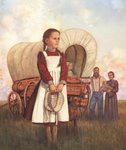Okay, I've been waiting a bit to post on this book, so as not to accidentally spoil anything for anyone who might not have had time to finish reading it yet. I think by now most of the avid Potter fans will have finished, so will go ahead and post now -- but with fair warning. If you've not yet read/finished Deathly Hallows, there WILL be spoilers in this post, and I strongly advise you NOT to read it yet!!!
Okay, moving on...
I don't really have a whole lot to discuss about this book. Upon finishing each of the other books, my mind was astir with questions and theories and speculations, and there was just so much to discuss with others, so many thoughts to share, so many ideas to put out there and see what others thought. Because at the end of each of the other books, there was still part of the whole story that was unknown, and still so much to try and figure out and understand. This book differs in that no longer am I trying to figure out what happened, and what is going to happen. The answers are very neatly summed up in this book, and I find myself with nothing to ask, nothing to speculate upon. I know from reading others' posts that others still have questions, but I really don't. I don't need to know what each character did for a living or if they had kids, or what their kids were like. That's not essential to the story, to the plot.
I'm very satisfied with the ending. I was a bit afraid that after being so tied up in this story for so many years, that I would be disappointed with the ending. I am thrilled to say that I am not. :)
For so many years, part of the Christian community has been very outspoken against these books. The majority of those people, I am sure, haven't read them, and don't understand what they are truly about. Do I think Rowling was intentionally writing a spiritual allegory? No, probably not, or she likely would have spoken up and said so by now. But did she write a spiritual allegory? In SO many ways!! This last book, and Harry's sacrifice, is a very fitting conclusion to a story that has been the basic good vs. evil story that has endured through the ages, and goes right back to Satan's fall, which started the good vs. evil story of the universe. That said, I see huge differences between Harry's and Jesus' deaths and resurrections, and am in no way saying that it is an exact allegory, the primary difference being that while both gave up their own lives willingly, and out of love, to save the rest of the world and to destroy evil, Harry was thinking of his love for his friends and saving them, Jesus was thinking of His love for His friends, but also His enemies, and even died to save the very ones who killed Him. That would be equivalent to Harry giving up his life to save Bellatrix LeStrange, Lucius Malfoy, Fenrir Greyback, etc. -- no way! Other than that difference, however, (which is crucial!) the sacrifices bear a lot of resemblance, and I think gives those Christians who have read the series a great entry point into spiritual discussion with others. I mean, the popularity of Harry Potter is HUGE -- and everybody wants to talk about them. What an awesome opportunity that has just been handed to us. :)
The quest for the Deathly Hallows... I have seen so many people say they thought this just took away from the book, didn't see the point of it, etc. I LOVED this part of the book. I think it MADE the book. Rowling apparently did too since she titled the book thus. :) After all, Harry and Voldemort share so many similarities. Both grew up without their parents. Both had horrible childhoods, where they were unloved and somewhat mistreated. Both had no idea they were magical until told at age 11, but had discovered their 'special abilities' previously by accident. Both considered Hogwarts their true home, the first place where anyone actually cared about them, the first place they really felt they belonged.
Now we have Voldemort and his quest to be immortal. He discovers a way to achieve this, although through the very darkest magic, which damages his soul. Now Harry is presented with another way to supposedly achieve this. Will he take it? Will he be like Voldemort and decide that if he is the most powerful wizard, he can use his power to rule over the others, and make it a better world (in his opinion)? He learns that Dumbledore once yearned for such power... but unlike Voldemort, Grindelwald, and Dumbledore, Harry makes a wise decision, and as Dumbledore himself says, is the "better man" in the end, which ultimately leads to Voldemort's demise. What about that is unnecessary? :)
Just my two cents.
Sunday, August 5, 2007
Subscribe to:
Post Comments (Atom)


No comments:
Post a Comment